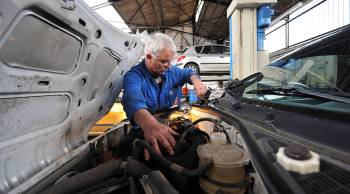TEXT OF INTERVIEW
SCOTT JAGOW: One of the things that attracts people to a city is its culture. Theaters, museums, galleries. But a series of studies from the University of Minnesota finds that artists have a much broader impact on a city’s economy than you might think. The latest study comes from economist Anne Markusen at the Humphrey Institute. Our economic correspondent Chris Farrell tells us more.
CHRIS FARRELL: What she argues is that the role of the artist is significant in generating economic growth, because what artists do is that they encourage the creation of specialized manufacturers like printing. They help create supply chains, so that the artists and the artist community itself is a generator of economic growth, vastly underestimated generator of economic growth. It’s not just an attraction for other people to live in an area. And so there’s been a series of studies and the latest, which is called Crossover, particularly looks at artists in two communities: San Francisco and Los Angeles.
JAGOW: What did they find about the artist community in those two cities and how it affects the economy?
FARRELL: The reason why they call their study Crossover is that you have your commercial world, your non-profit world and your community world. What they found is that most artists throughout their career move between the three. They make some money in the commercial world and they get some reward in the commercial world, they also spend some time in the non-profit world and doing community work.
JAGOW: Well let’s say I’m a city leader in the Midwest somewhere, and I see this study. What can I do to benefit from it?
FARRELL: First of all, state and local economic development is still way too influenced by brick and mortar and tax breaks. One city is going to give a break to some company that’s in another city to move here and build their headquarters and they give them all kinds of breaks. Look, you want to develop your region, you want o focus on your human capital, you want to focus on people. You know, making it easier to turn warehouses into dance studio space or encouraging the growth of theater in your area and sort of making the regulations and the zoning that puts a lot of barriers to these changes. You can make that type of a change is a lot cheaper but it’s also where a lot of your economic development is going to come from. Spending taxpayer money to lure manufacturing plants, downtown headquarter buildings, that’s essentially a zero-sum game. And it’s much better for government to focus on human capital, especially artistic and creative labor rather than buildings development and companies.
JAGOW: Alright Chris thanks a lot.
FARRELL: Thank you.
JAGOW: Chris Farrell is the Marketplace economics correspondent. In Los Angeles, I’m Scott Jagow. Thanks for tuning in and have a great day.
There’s a lot happening in the world. Through it all, Marketplace is here for you.
You rely on Marketplace to break down the world’s events and tell you how it affects you in a fact-based, approachable way. We rely on your financial support to keep making that possible.
Your donation today powers the independent journalism that you rely on. For just $5/month, you can help sustain Marketplace so we can keep reporting on the things that matter to you.


















